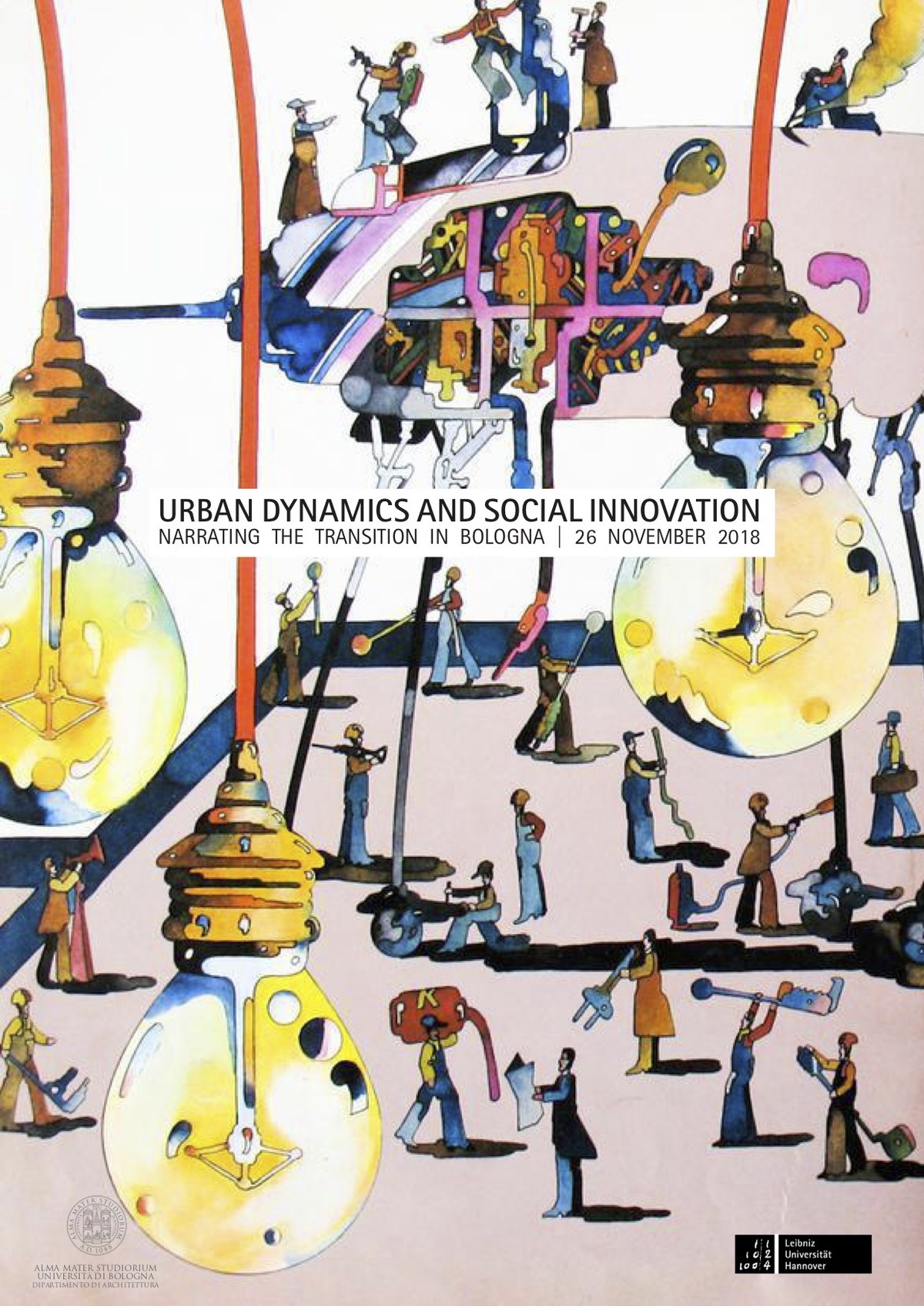Urban Dynamics and Social Innovation. Narrating the Transition in Bologna
Workshop internazionale
-
Data: 26 NOVEMBRE 2018 dalle 8:30 alle 19:00
-
Luogo: Aula 3.3 e Aula Magna, Scuola Ingegneria e Architettura, viale Risorgimento 2, Bologna
-
Tipo: Workshop

Referenti: Valentina Orioli, Valentina Gianfrate, Martina Massari
Crediti: 1 (partecipanti), 3 (organizzatori e relatori)
IN COLLABORATION WITH Alma Mater Studiorum Università di Bologna, Dipartimento di Architettura and Institut fur Entwerfen und Städtebau, Leibniz Universität Hannover
INTRODUCTION
A center of resistance during World War II, Bologna has a deep history of civic engagement. It is the first city in adopting new regulations allowing residents to partner with the city to revitalize and take care of public spaces and services. Since 2014 Bologna has been implementing a model of “Collaborative City” based on a broad and consolidated network of social relationships, a system of shared spaces, opportunities and facilities, availability of enabling technologies and large amounts of data. This strategy aims at reinforcing the proximity and proposing the diffuse quality of the city as an internationally competitive value. As stated in the new Urban Innovation Plan, the distinctive feature of the Bolognese model is the concept of ‘spaces and places’, potential capital to be released as opportunity for the communities to interact.
The Collaborative policies spurred the city to establish Neighbourhood Labs, platforms of collaboration and innovation where public staff and residents connect to develop ideas and co-design initiatives for specific buildings and centers.
The Neighbourhood Lab is the space for relationships and interaction with citizens and works, depending on the objectives, on different scales, neighbourhood, district, activating specific development paths. The Labs promoted by the municipality since May 2017, are growing to become flexible outpost for the public administration in specific neighbourhoods, building stable local processes to enable innovation and mutual learning and creating proximity spaces. The Labs are developing transformations for new hubs as cultural centers, new spaces of urban co-production, related to youth, culture, sport, social activities and community development: 11 areas of intervention among the 6 neighbourhoods of Bologna were selected to be financed and developed.
The selection started from the priorities that emerged during the “Collaborare è Bologna” path, based on the presence of on-going actions and socio-demographic criticalities. The specific areas were identified, along with the associations, the active collaborations and the communities operating in those areas, in order to involve them in the following phases of transformation. The main uses foreseen for the areas are related to youth, culture, sport, social activities and community development. The selected Hubs for each Neighbourhood Lab are undergoing a regeneration phase, that foresees in January 2019 the start and monitoring of the construction sites, which are supposed to end in December 2020. During the construction sites these spaces will remain in transition, therefore it will be necessary to make them recognisable, communicate their future use and role for the neighbourhood and the city (MM).
OBJECTIVES AND TASKS
The one-day workshop in Bologna, aims to explore the transformation potentialities of the transition phase of 8 of the hubs selected through the Neighbourhood Lab process, addressing it in terms of design, character, communication, new urban networks and impulses. The participants are Bachelor and Master students from the Institut für Entwerfen und Städtebau, Leibniz Universität Hannover, in collaboration with the course of Service Design and Urban Policies and the PhD Architecture Students from the University of Bologna, The aim is to define a strategy to address the transition of these places, to look for future dynamics in the neighbourhood, to narrate their role and memory, to communicate the future use and to define their spanning network in the city.
PROGRAMME
- 8.30 (room 3.3) start workshop - Introductions
- 9.00 (room 3.3) working phase - Groups: bachelors LUH + MasterLUH + Design students UNIBO
- 12.00 (room 3.3) intermediate correction - Reviewers from LUH and UNIBO
- 15.00 (Aula Magna) working phase
- 16.00 (Aula Magna) final correction
- 17.00 (Aula Magna) inputs
- 18.00 (Aula Magna) presentations and discussion